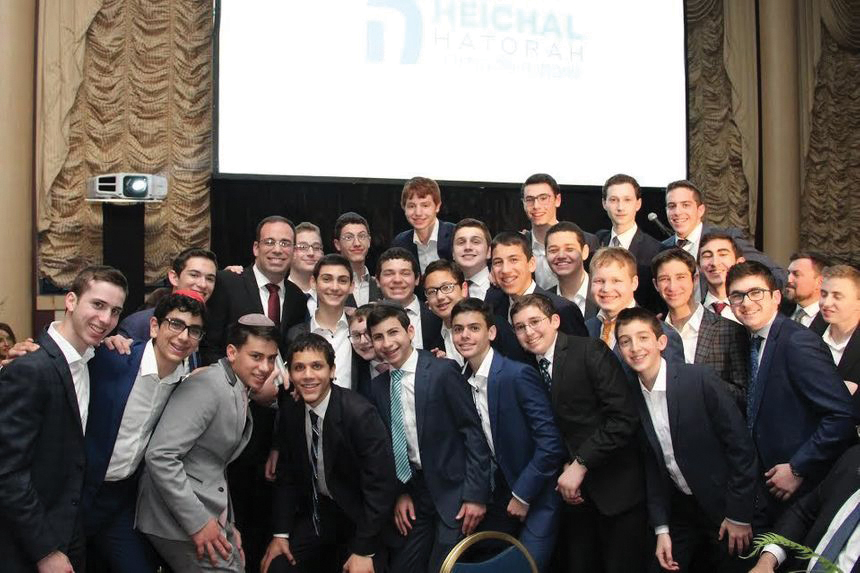

By Elliot Kaufman
Originally published in the Wall Street Journal
Graduates of Heichal HaTorah should be “budding Talmud scholars,” says Rabbi Aryeh Stechler, headmaster of the all-boys Orthodox Jewish yeshiva high school. That’s not all. The boys should also appreciate “how unique this country’s values are, and how much America has done for the Jews.”
For two years, Heichal HaTorah has piloted the Tikvah Humanities Curriculum, a Great Books honors track for ninth- and 10th-graders studying Western history, literature and philosophy. The Tikvah Fund, the foundation behind the curriculum, believes Heichal is the only Jewish high school in America with a classical-education program.
At some Orthodox schools, subjects such as English, history and math take a back seat to the analysis of Jewish texts. Others, especially in Modern Orthodox communities, dial back the Judaic studies somewhat to provide rigorous all-around education. They usually do that, however, by aping top secular schools, adopting progressive curricula that can be hostile to traditional values.
Heichal HaTorah is evidence that there’s a better way, suggests Rabbi Mark Gottlieb, senior director of the Tikvah Fund. Better, he says, to “infuse the humanities with the Jewish spirit” than “look over one’s shoulder for the latest fad,” be it vulgar contemporary novels or revisionist history textbooks that Howard Zinn might applaud. Heichal HaTorah, which advertises a “classic yeshiva education and superior general studies program,” articulates a different vision of cutting-edge Jewish education.
Heichal’s honors students display impressive range in the classroom. Back in June, ninth-graders were reading Meister Eckhart, a German medieval theologian, and discussing the West’s evolving understanding of G-d and man. A question arose and a student shouted a relevant line from the Torah, quoting it in Hebrew. While I struggled to connect the dots, another student compared Eckhart’s view to an older one from myths about Hercules. A third cited Cicero.
“It’s like studying Talmud,” said Shaya Zimerman, 16. “Even on one tiny bit, there are so many different opinions. So you start at the beginning, go in depth, read the opinions and work through it.” Aggressive annotations in the margins of his source sheet attested to his training.
Few are better primed to appreciate great texts from long ago than yeshiva students. “Of course the old arguments of the Talmud shape the Jewish laws we follow,” said Tzvi Ginzberg, 16. “But Thomas Paine’s ‘Common Sense’ also influences how we live, right now, in America. It influences what we believe.”
I asked at random about the ideas of the French Revolution, which they studied earlier in the year. Quickly, a 10th-grader explained that the revolutionaries’ universalism sadly encouraged France to export its revolution by force. More broadly, TZvi said he disapproves of theorizing about politics from the “state of nature.” I asked if that means the American revolutionaries were wrong, too. “Not all of them were Lockeans,” he responded, rejecting my premise. “Many only claimed the traditional rights of Englishmen, which Britain was clearly violating.”
Rabbi Mitch Rocklin of the Tikvah Fund smiles with pride. He’s the principal instructor of the honors track at Heichal HaTorah, and he’s on a mission to revive Jewish classical education, once a requirement at several top Orthodox schools in prewar Europe. “It allows students to see themselves as part of a living Western tradition to which their Jewish faith is fundamental,” he maintains. Rabbi Rocklin highlights the connections by including contemporaneous Jewish texts in his lessons. “The students start to love their Jewish religion in a new way,” he says.
He tries to show Jews “what their religion has to do with their culture, and what their culture has to do with their religion.” It seems to be working. This year Heichal’s honors track will expand to the 11th grade and a new Tikvah program will launch at Bais Yaakov Machon Ora, an all-girls Orthodox Jewish school in Passaic, N.J.
Rabbi Rocklin, who is both a Princeton postdoc and a chaplain in the New Jersey Army National Guard, told his students the course he taught would be the hardest they’ve ever taken. He has worked equally hard, even volunteering to record a lesson while on duty in Erbil, Iraq. (The boys didn’t mind when the takeoff of a V-22 Osprey aircraft interrupted his lesson.) Finding people willing and able to teach such a wide-ranging curriculum may be an obstacle to the growth of Jewish classical education. Another is that many parents want their children prepared intensively for Advanced Placement exams. Rabbi Rocklin says his students will be ready, but insists he won’t “bow down at the altar of AP.”
No doubt some compromises will be necessary. But if traditional schools are going to teach secular subjects, it makes sense to teach them traditionally. Rabbi Rocklin’s students deserve to learn the best the West has thought and said. It’s their patrimony, too.
Mr. Kaufman is an assistant editorial features editor at the Journal. He has attended and helped select participants for Tikvah Fund educational programs.